- Accra and Cape Coast Escape: A Thoughtful Tour of Ghana’s Heritage and Nature
- Key Points
- Exploring the Ghanaian Heritage and Nature in Depth
- What’s Included in the Tour
- Day 1: From Rainforest to Slave Castles
- Day 2: Accra’s Cultural Heart
- Practicalities and Logistics
- Guides and Customer Experience
- Overall Value and Suitability
- Final Thoughts
- Who Should Consider This Tour?
- FAQ
- More Food & Drink Experiences in Accra
- More Tours in Accra
- More Tour Reviews in Accra
- Still browsing? Here are more Accra experiences we've covered recently
Accra and Cape Coast Escape: A Thoughtful Tour of Ghana’s Heritage and Nature
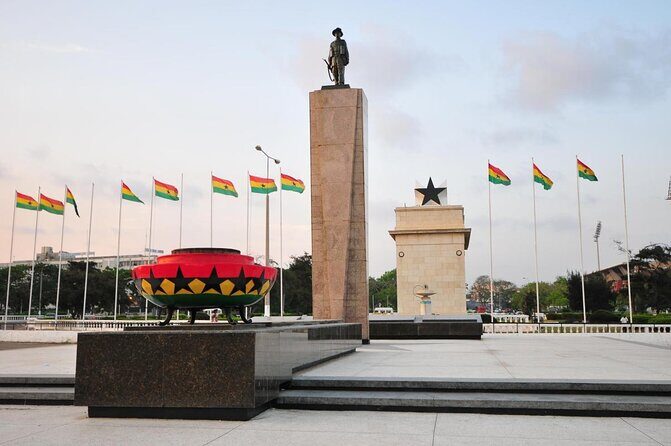
Travelers interested in Ghana’s past and present will find this 2-day tour a compelling way to connect with the country’s soul. From the Atlantic slave trade sites to vibrant city landmarks, this experience packs a lot into a reasonably priced package. We’ve reviewed the details based on many traveler insights and can honestly say it offers a balanced mix of history, culture, and nature.
What excites us most about this tour is its comprehensive itinerary—covering iconic castles, lush rainforest views from Kakum National Park, and key Accra landmarks. The guides are often praised for their knowledge, adding depth to each site. The value for money also stands out, especially given the comprehensive list of sites included in the $250 per person cost. On the flip side, some travelers note the long travel times, especially the four-hour drive to Kakum Park, which could be tiring for some. This tour is best suited for those who love a mix of history and outdoor adventure within a short span.
Key Points
- Rich historical insights at Elmina and Cape Coast castles give a profound look into Ghana’s past.
- Stunning views from Kakum’s canopy walkway offer a rare perspective of the rainforest.
- Expert guides enhance the experience with detailed storytelling and cultural context.
- Good value for the price, covering transportation, entrance fees, and site visits.
- Comfortable group size and pickup service make logistics smoother.
- Authentic shopping opportunities at local crafts markets add a memorable touch.
Looking for more options in Accra? We've reviewed plenty of other experiences.
Exploring the Ghanaian Heritage and Nature in Depth
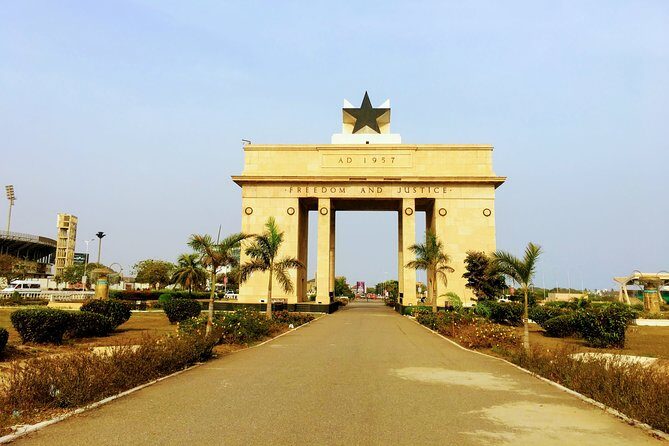
What’s Included in the Tour
This 2-day adventure offers a practical, all-inclusive experience—transportation, entrance fees, and guiding support—making it a stress-free way to explore Ghana’s highlights. The tour starts with hotel pickup in Accra, which removes the hassle of navigating public transit, especially when traveling with a group or family.
You’ll visit sites that illuminate Ghana’s complex history, such as Elmina Castle—established in 1482 by the Portuguese—and Cape Coast Castle, both of which played critical roles in the transatlantic slave trade. The inclusion of these UNESCO World Heritage sites means you’ll gain a visceral understanding of the dark chapters of history that shaped the continent.
The trip also features Kakum National Park, a haven for nature lovers, with its famous canopy walkway suspended 30 meters above ground. This attraction isn’t just pretty; it offers an impressive vantage point over the lush, untouched rainforest. The park is home to over 200 bird species and endangered animals like forest elephants and bongos, making it a highlight for wildlife enthusiasts.
Day 1: From Rainforest to Slave Castles
The day begins with a two-hour visit to Kakum National Park. Reviewers consistently praise this part for its breathtaking view and the thrill of walking across the canopy walkway. The trail is suitable for self-guided hikes, and the lush vegetation provides a vivid picture of Ghana’s verdant side.
Afterward, the tour shifts gears to history with stops at Elmina Castle, the oldest European building in existence below the Sahara. The castle’s walls tell tales of trade, conquest, and the slave trade—powerful stories that leave a lasting impression. Visitors often comment on how impactful and emotional these visits are, with many noting how the guides help contextualize the sites’ significance.
The final stop on day one is Cape Coast Castle, which is larger and arguably more imposing. It served as a hub of the slave trade and was built in the 16th century by the Portuguese, then reconstructed by the Danes in stone. The site offers guided tours that reveal the harsh realities faced by enslaved Africans, with some visitors describing it as “heartbreaking” yet necessary to remember.
Day 2: Accra’s Cultural Heart
The second day is dedicated to Ghana’s capital city. The W.E.B. DuBois Center is a highlight, especially for those interested in Pan-Africanism. The center not only functions as a museum but also as DuBois’s former residence, where the stories and personal effects of this influential figure come alive. Visitors find it fascinating to see his graduation robes and personal library.
Next up is Kwame Nkrumah Memorial Park, home to the bronze statue of Ghana’s first president. It’s a place to reflect on Ghana’s journey to independence, and many reviews commend the informative displays about Nkrumah’s leadership. The park acts as a reminder of Ghana’s pioneering role in African liberation.
The Independence Square—also known as Black Star Square—is a sprawling space that commemorates Ghana’s independence. It features the Black Star Gate and the Independence Arch, symbols of freedom that inspired many other African nations. Visitors often note the impressive scale of the square and its symbolic importance.
Finally, the Center for National Culture provides a lively shopping experience. Stalls brimming with Kente cloth, wooden sculptures, jewelry, and traditional attire give travelers a chance to pick up authentic souvenirs. Many reviewers enjoy browsing here, describing it as a vibrant, must-visit spot for arts and crafts.
Practicalities and Logistics
Pricing at $250 per person might seem modest given the full itinerary, but it’s important to recognize that this fee covers all entrance fees, transportation, and guiding, making it a solid value. The tour operates with a maximum of 40 travelers, which balances group interaction with enough space for personal experience.
The pickup and drop-off service within Accra simplifies planning, especially if you’re staying near the meeting point, Accra Mall. The tour runs daily from noon to late evening, offering flexibility for different schedules. However, keep in mind the drive to Kakum Park takes about four hours, which means some travelers might find the long vehicle time a bit tiring.
Guides and Customer Experience
Guide quality varies, but many reviewers praise the knowledgeable, friendly guides like Zainab, who make the experience more enriching. She’s described as kind and engaging, providing useful insights during the drive and site visits. Some reviewers mentioned a few communication hiccups about itinerary changes, but overall, customer service seems attentive, and guides are a highlight for many.
Overall Value and Suitability
For those interested in history, culture, and nature, this tour offers a comprehensive snapshot of Ghana. The price includes the bulk of costs and entry fees, making it a good deal for travelers wanting a structured, guided experience without worrying about logistics. It’s particularly well-suited for first-time visitors, history buffs, or those keen to see both urban and rural Ghana in a short period.
Final Thoughts
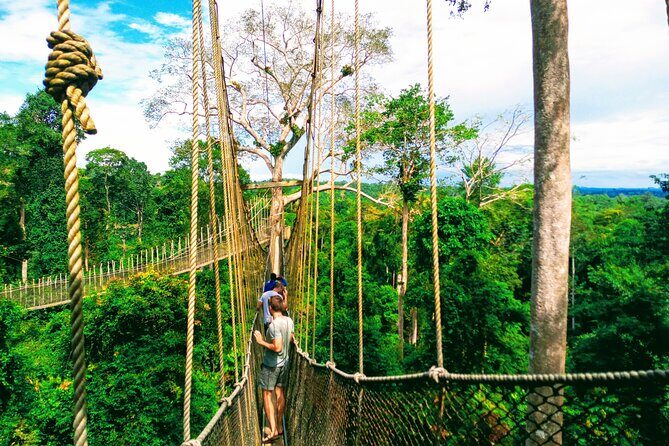
This Accra and Cape Coast Escape tour manages to blend powerful historical lessons with breathtaking natural scenery. It’s a thoughtful mix that makes it suitable for curious travelers who want to understand Ghana’s past while enjoying its landscapes. The inclusion of key sites like the slave castles and Kakum Park ensures you won’t leave without a deep appreciation for the country’s complex identity.
Travelers who value guides with local expertise, a well-organized itinerary, and authentic shopping experiences will find this tour a worthwhile investment. While long travel times and the intensity of some site visits might be tiring, the overall experience is enriched by its meaningful content and good value.
Who Should Consider This Tour?
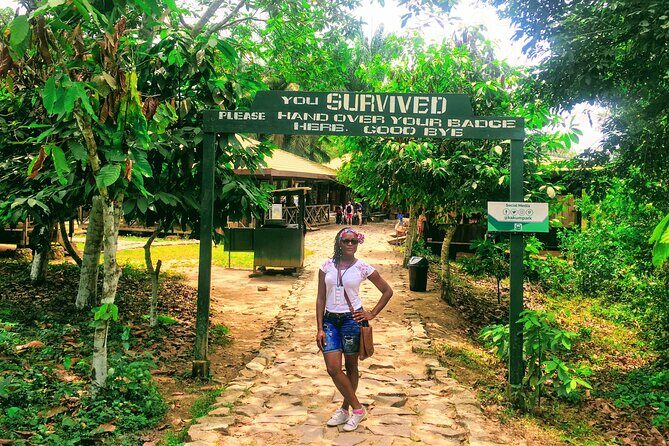
If you’re looking for a comprehensive introduction to Ghana’s history, culture, and natural beauty, this tour is a smart choice. It’s perfect for history enthusiasts, outdoor lovers, and cultural explorers seeking an organized, informative experience. It also suits travelers who prefer guided tours with included transportation and entrance fees, easing the logistics of their trip.
Those with a keen interest in the slave trade, Ghanaian heritage, or rainforest landscapes will especially appreciate the stops and stories shared along the way. However, if you prefer more relaxed, private excursions or are sensitive to long vehicle rides, you might want to consider smaller or alternative options.
FAQ
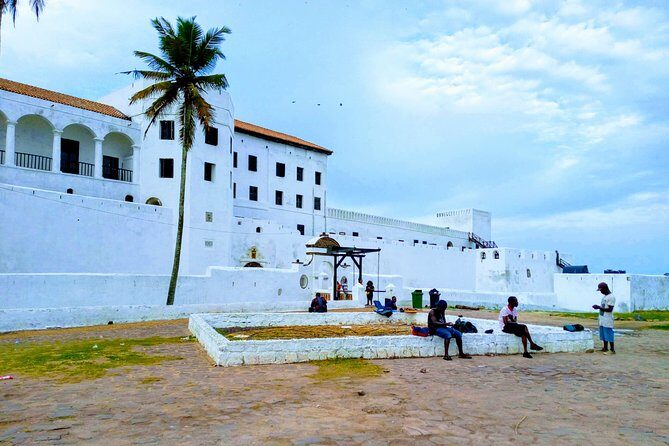
Is the tour suitable for children?
The tour is generally suitable for most travelers, including families, as long as children are comfortable with long drives and site visits. Always check with the provider if your child has special needs or young age considerations.
Are meals included in the tour?
No, daily meals are not included, so you should plan to bring snacks or have meals before or after the tour.
What should I wear for Kakum National Park?
Comfortable walking shoes are recommended, especially for the canopy walkway. Light, breathable clothing suited for tropical weather is best, along with a hat and insect repellent.
Can I shop for souvenirs during this tour?
Yes, the stop at the Center for National Culture offers a lively market where you can buy traditional arts, crafts, and clothing.
Is transportation comfortable?
The tour includes local transportation in a vehicle supported by fuel charges and taxes, ensuring a smooth ride. Reviewers mention the drive to Kakum as lengthy but comfortable.
Do I need to book in advance?
Yes, booking about 43 days in advance is typical, and the tour runs daily from noon to late evening, providing flexibility.
Can I cancel if my plans change?
Yes, there’s free cancellation up to 24 hours before the tour, offering peace of mind for last-minute schedule changes.
What’s the maximum group size?
Up to 40 travelers, which balances group interaction with personal space.
Are guides available in languages other than English?
The information doesn’t specify, so check with the provider if you need language support.
Is the tour accessible for people with mobility issues?
Most sites involve walking and some uneven terrain, so it’s best to check with the tour operator for specific accessibility concerns.
To sum it up, this tour offers a well-rounded exploration of Ghana’s main attractions, combining history, wildlife, and city life within a manageable budget. It’s ideal for first-timers, history buffs, and those eager to experience both urban and rural Ghana. Expect powerful stories, stunning views, and memorable shopping—all delivered with the support of knowledgeable guides.
More Food & Drink Experiences in Accra
More Tours in Accra
More Tour Reviews in Accra
Still browsing? Here are more Accra experiences we've covered recently
- Explore Aburi Botanical Gardens And Boti Falls
- Accra to Aqua Safari Resort Eco-Friendly Tour with Meal
- African Naming Ceremony
- Accra: Cocoa Farm & Waterfalls Tour
- ACCRA GUIDED CITY TOUR, GHANA
- Accra Slave Tour
- Traditional Beadmaking Workshop
- 10 Days Heritage, History and Adventure Tour in Ghana
- Accra: Whirlwind Guided City Tour by Car with Entry Fees
- Accra: Guided 10-Day Panafest Festival 2025 Tour
- From Accra: The Cape Coast Day Tour Guided Experience
- Ghana: 3 Days Sightseeing
